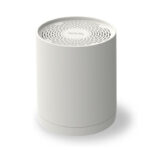Can breathing polluted air weaken our immune system?

Reduced immune response

How?
Continued exposure to air pollutants such as fine particulate matter (PM2.5) can cause chronic inflammation in the body that causes a weakening of the immune system, making it less effective in fighting viruses and diseases.
This damage is responsible for increased susceptibility to respiratory infections, such as bronchitis, pneumonia, and upper respiratory tract infections.
In addition, the weakening of the immune system due to air pollution can increase vulnerability to chronic diseases, such as asthma, cardiovascular disease, and diabetes. These are conditions that can further compromise the immune system, creating a vicious cycle of impaired health.
In general, breathing polluted air can have numerous adverse effects on human health, both short- and long-term.
Short-term effects

Pollutants such as particulate matter can cause burning, tearing and redness of the eyes.
Air pollution can also cause a temporary increase in blood pressure that can lead to an elevated risk of i cardiovascular events, especially in people already at risk.
Finally, breathing polluted air can generate the manifestation of symptoms such as headaches, dizziness, and fatigue.
Long-term effects

Prolonged exposure to air pollution can contribute to the development of chronic lung diseases such as chronic bronchitis and chronic obstructive pulmonary disease (COPD). Inhalation of certain air pollutants such as particulate matter (PM2.5) and toxic chemicals has been linked to an increased risk of lung cancer.
Maternal exposure to pollution during pregnancy can adversely affect fetal development, causing low birth weight, preterm delivery, and congenital abnormalities.
In children, it can affect growth, lung function, and neurodevelopment leading to cognitive and behavioral problems.
Air pollution has also been associated with increased symptoms of anxiety and depression.
Finally, according to very recent studies, a relationship has emerged between polluted air and an increased risk of dementia and other cognitive problems in the elderly.
Air pollution poses a serious threat to public health. These effects highlight the importance of reducing exposure to air pollution in order to protect the health of the immune system and reduce the risk of infections and diseases.
There is a need to take strategic measures and promote policies that improve air quality at local, national and global levels.
Monitoring what we breathe every day within our living spaces is the first step toward prevention.
Learn about Radoff’s solutions







